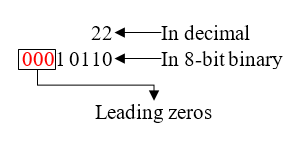Write a C program to input any number from user and find total number of leading zeros of the given number. How to find total leading zeros of a given number (in binary representation) using bitwise operator in C programming. Logic to count total leading zeros of a given number using C programming.
Example
Input
Input any number: 22
Output
Output leading zeros: 27 (using 4 byte signed integer)
Required knowledge
Bitwise operators, Data types, Variables and Expressions, Basic input/output, If else, For loop
Logic to count leading zeros in a binary number
Leading zeros in a binary number is equal to zeros preceding the highest order set bit of the number.

Step by step descriptive logic to count leading zeros in a binary number.
- Input number from user. Store it in some variable say, num.
- Find total bits required to store an integer in memory say,
INT_SIZE = sizeof(int) * 8.Must know – How to find size of a data type using sizeof() operator.
- Initialize a variable and set its MSB to 1, say
msb = 1 << (INT_SIZE - 1);. - Initialize a variable to store leading zeros count, say
count = 0;. - Run a loop from 0 to INT_SIZE. The loop structure should look like
for(i=0; i<INT_SIZE; i++). - Inside the loop, left shift num, i times and check its MSB is set or not. If its MSB is set i.e.
if((num << i) & msb)then terminate the loop; otherwise increment count by 1.
Program to count leading zeros in a binary number
/**
* C program to count leading zeros in a binary number using bitwise operator
*/
#include <stdio.h>
#define INT_SIZE sizeof(int) * 8
int main()
{
int num, count, msb, i;
/* Input number from user */
printf("Enter any number: ");
scanf("%d", &num);
// Equivalent to
// 10000000 00000000 00000000 00000000
msb = 1 << (INT_SIZE - 1);
count = 0;
/* Iterate over each bit */
for(i=0; i<INT_SIZE; i++)
{
/* If leading set bit is found */
if((num << i) & msb)
{
/* Terminate the loop */
break;
}
count++;
}
printf("Total number of leading zeros in %d is %d", num, count);
return 0;
}Below is another short and effective approach to solve the program.
Program to count leading zeros in a binary number using while loop
/**
* C program to count leading zeros in a binary number using bitwise operator
*/
#include <stdio.h>
#include <limits.h> // Used for INT_MAX
int main()
{
int num, count;
/* Input number from user */
printf("Enter any number: ");
scanf("%d", &num);
count = 0;
while(!(num & (~INT_MAX)))
{
count++;
num <<= 1;
}
printf("Total number of leading zeros = %d", count);
return 0;
}INT_MAX is a constant defined in limits.h header file. It is used to get maximum range of integer.
The statement num <<= 1; is a shorthand assignment operator equivalent to num = num << 1;
Output
Enter any number: 22 Total number of leading zeros in 22 is 27
Important Note: Different compilers may yield different output. Since, data types size is machine dependent.
Happy coding 😉
Recommended posts
- Bitwise operator programming exercises index.
- C program to count trailing zeros in a binary number.
- C program to toggle nth bit of a number.
- C program to flip bits of a binary number using bitwise operator.
- C program to total number of zeros and ones in a binary number.
- C program to convert decimal to binary number system using bitwise operator.
